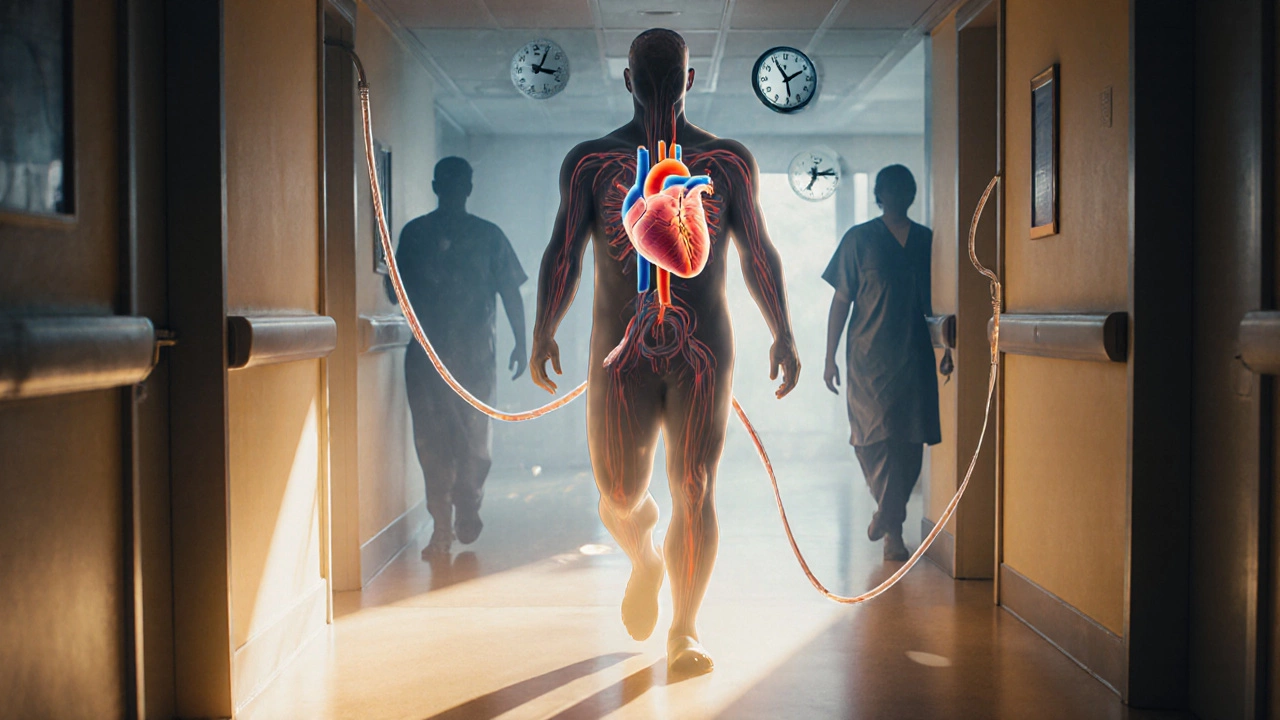Heart Transplant Recovery Timeline Calculator
Personal Recovery Profile
Your Recovery Expectations
Next Milestone:
When people ask what the hardest surgery to recover from is, the answer isn’t just about pain or length of hospital stay. It’s about how your body rebuilds itself from the inside out-how your lungs learn to work with a new heart, how your mind adjusts to a life that’s no longer predictable, and how your daily routines turn into a full-time job of healing. For many, that surgery is a heart transplant.
Why a heart transplant is the toughest recovery
A heart transplant isn’t like replacing a broken knee or fixing a hernia. Your heart doesn’t just beat-it controls your entire system. When you get a new one, your body doesn’t immediately accept it. Even with powerful immunosuppressants, your immune system sees the new organ as an invader. That means you’re stuck in a balancing act: take enough drugs to stop rejection, but not so much that you get sick from infections or develop cancer.
Recovery isn’t a straight line. It’s a series of plateaus and setbacks. In the first week, you’re in the ICU, connected to machines that monitor every heartbeat. By week two, you’re walking down the hallway with oxygen tubes still taped to your nose. By month three, you’re doing light rehab, but you can’t lift a gallon of milk without your heart racing. And you’re not done yet.
The daily reality of recovery
After discharge, life changes completely. You take 10 to 15 pills every day-some to prevent rejection, others to lower blood pressure, control cholesterol, or protect your kidneys. Missing a single dose can trigger rejection. Many patients keep a pill organizer with color-coded compartments and alarms set for every hour.
You can’t eat raw sushi, undercooked eggs, or unwashed fruit. You avoid crowds during flu season. You wash your hands 20 times a day. You carry a medical ID card that lists every medication and your transplant center’s emergency number. Your social life shrinks. Family dinners become risky. Travel requires planning with your cardiologist months in advance.
And then there’s the emotional toll. You’re grateful to be alive-but you’re also haunted by the fact that someone else died for you to live. Many patients report survivor’s guilt, anxiety about rejection, or depression from the constant medical vigilance. Studies show nearly 40% of heart transplant recipients experience clinical depression in the first year. It’s not just physical recovery-it’s psychological rebuilding.
What recovery looks like month by month
- Weeks 1-4: Hospital stay. Monitoring for infection, rejection, and arrhythmias. Physical therapy starts with sitting up and taking a few steps.
- Month 1-2: Outpatient visits twice a week. Biopsies to check for rejection. Weight gain from steroids. Fatigue so deep it feels like you’re walking through wet concrete.
- Month 3-6: Gradual increase in activity. Most people return to light work. Still no driving (due to medication side effects). Blood tests every 7-10 days.
- Month 6-12: Biopsies reduce to every 3 months. Exercise becomes part of your routine-walking, swimming, stationary cycling. Many start to feel like themselves again, but never the same.
- Year 2 and beyond: Long-term maintenance. Annual echocardiograms, stress tests, and coronary angiograms. The risk of rejection never goes away. The new heart can last 10-15 years, sometimes longer-but you’re always one infection away from disaster.

How heart transplant recovery compares to other major surgeries
Some might argue that brain surgery or spinal fusion is harder. But those surgeries fix something that was already yours. A heart transplant replaces your most vital organ with a stranger’s. You’re not healing-you’re adapting.
Compare it to a lung transplant: similar immunosuppression, but lungs don’t control rhythm or blood pressure like the heart does. Liver transplants have high success rates, but the liver regenerates. A transplanted heart doesn’t heal itself-it just keeps beating, and you have to keep protecting it.
Even bypass surgery, which is far more common, has a shorter recovery. Most people walk within 48 hours, return to work in 6 weeks, and don’t need lifelong immunosuppressants. A heart transplant? You’re on lifelong medication, with regular biopsies, and a constant fear of rejection.
Who recovers the best?
Not everyone recovers the same way. Younger patients (under 55) with no prior lung or kidney disease tend to bounce back faster. Those with strong social support-family who can drive them to appointments, help with meals, or just sit with them during anxiety attacks-do better. So do people who stick to their rehab plan: daily walks, low-sodium diet, no smoking, no alcohol.
But even the most compliant patients face surprises. One woman in Bangalore, 58, recovered well for two years-then got a minor cold that turned into pneumonia. Her heart started rejecting. She spent six weeks back in the hospital. That’s the cruel truth: recovery doesn’t end. It just changes shape.

What no one tells you before the surgery
Most patients think recovery means getting back to normal. But you don’t go back to who you were. You become someone new-someone who checks their pulse every morning, who knows the names of every drug they take, who can’t hug someone with a cough without guilt.
You learn to celebrate small wins: the first time you climb a flight of stairs without stopping. The first time you cook a meal for your family. The first time you laugh so hard your chest hurts-but it’s because you’re alive, not because you’re in pain.
And you carry a quiet gratitude-not just for the donor, but for every nurse who stayed late, every pharmacist who explained your meds, every stranger who donated blood so you could survive another day.
Can you live a full life after a heart transplant?
Yes-but it’s not the life you imagined. You won’t run marathons. You won’t hike mountains. But you can watch your grandkids grow. You can travel to see your children. You can sit in the garden and feel the sun. Many transplant recipients live 15 to 20 years or more. Some even reach 30.
Success isn’t measured by how fast you heal. It’s measured by how fully you live after you’ve been given a second chance.
Is heart transplant the hardest surgery to recover from?
Yes, among major organ transplants, heart transplants are widely considered the most difficult to recover from. Unlike other surgeries that repair or remove damaged tissue, a heart transplant replaces your most vital organ with a donor’s, requiring lifelong immunosuppressants, frequent biopsies, and constant vigilance against rejection and infection. Recovery takes months to years and changes your life permanently.
How long does it take to recover from a heart transplant?
Full recovery takes at least 6 to 12 months, but the process never truly ends. Most patients return to light work by 3 to 6 months, but they remain on lifelong medications and undergo regular testing. Physical strength returns gradually, but emotional and psychological adaptation continues for years. Even after a decade, patients still need annual heart checks and blood tests.
What are the biggest risks after a heart transplant?
The biggest risks are organ rejection, infection, and side effects from immunosuppressant drugs. Rejection can happen anytime, even years after surgery. Infections are dangerous because the immune system is suppressed. Long-term drug use can lead to kidney damage, high blood pressure, diabetes, or cancer. About 1 in 3 patients develop coronary artery disease in the transplanted heart within 10 years.
Can you exercise after a heart transplant?
Yes, and it’s encouraged. Most patients start walking within weeks and gradually build up to swimming, cycling, or light strength training. Cardiac rehab programs are standard. But heavy lifting, contact sports, and extreme endurance activities are discouraged. Your heart doesn’t respond to exercise like a natural one-it can’t increase its rate as quickly, so pacing is key.
Do heart transplant patients live a normal life?
They live a meaningful life, but not a normal one. Daily routines revolve around medication, doctor visits, and avoiding illness. Social activities are limited. Travel requires planning. But many return to work, travel, and enjoy time with family. Their definition of "normal" changes. Success isn’t about returning to who they were-it’s about embracing who they’ve become.

 Are IVF babies just as healthy? The real data on long-term health outcomes
Are IVF babies just as healthy? The real data on long-term health outcomes
 IVF Cost per Cycle: How Much Does One Round Really Cost?
IVF Cost per Cycle: How Much Does One Round Really Cost?
 Can an Orthopedic Doctor Fix a Pinched Nerve?
Can an Orthopedic Doctor Fix a Pinched Nerve?
 Understanding the Difference Between Holistic and Homeopathic Medicine
Understanding the Difference Between Holistic and Homeopathic Medicine
 Herbal Supplements: What Are the 3 Main Supplements You Should Know?
Herbal Supplements: What Are the 3 Main Supplements You Should Know?